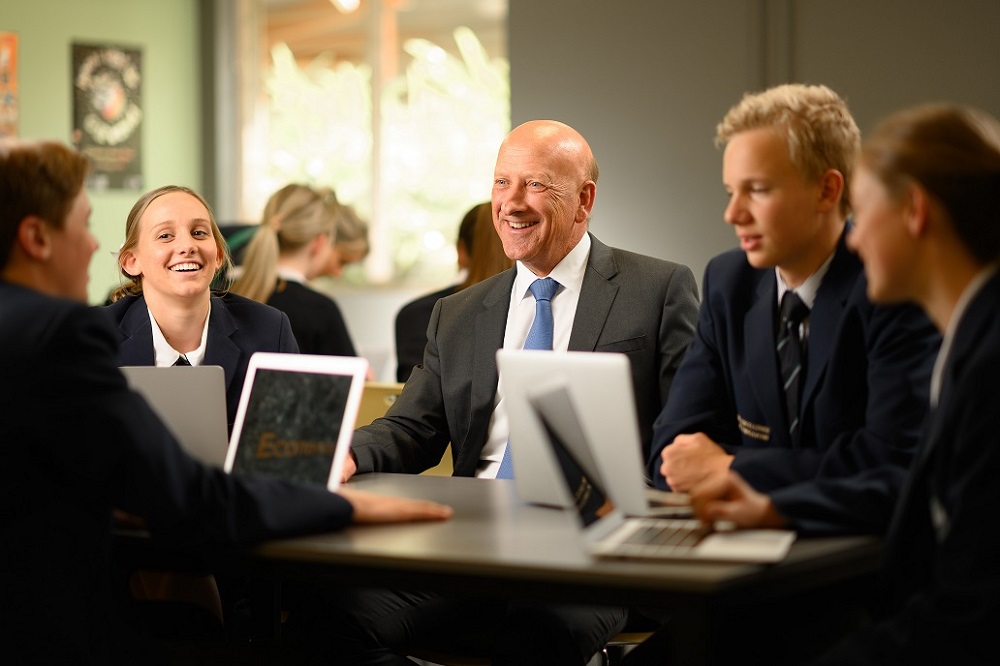
After roles as Deputy Head in two schools in New South Wales and 14 years as Headmaster of Hale School in Western Australia, the call of a ‘young’ (less than 30 years in operation as opposed to Hale’s existence of 155 years), co-educational environment was strong.
The Flinders reputation of outstanding academic achievement, ranking consistently, rather than ‘flash in the pan’ results, among the best schools in Queensland and, according to a former principal, with ‘lovely students’, not to mention the unrivalled physical setting, were enough to secure my interest and application for the position.
Interestingly, my first visit to the College for an interview involved a three-hour drive ‘up the Bruce’ from Brisbane airport one Friday afternoon. It is an aspect of the role that is ever-present in one’s thinking in terms of connection with professional life in Brisbane and while many endure the daily commute, the ‘Bruce’ factor is one that impacts the opportunities for staff and students on many levels.
My overarching philosophy is that a school should seek to inspire students to learn, lead and serve as they strive for excellence together. Core values which are the foundation of Christian principles should underpin the culture of the school so the students are well prepared to take their place in the wider world.
I believe one of my key responsibilities is to attract, retain and develop outstanding members of staff. We expect so much of our teachers; they need to know their subject so well they can ‘throw open’ window after window into the future for each student. We expect them to thoroughly like what they are doing. We expect teachers to know their students. On top of this we expect teachers to know much else. They cannot be mentors unless they are interesting people who belong to the real world.
Aligned to this belief is the importance of positive relationships, empowering the different stakeholders to develop genuine responsibility for their part in the College's future. Indeed, the College has a significant role in providing holistic support to its students at all times, but most especially where traditional family structures are becoming less capable of providing that support. A school striving for excellence must understand that its role is not simply achieving high academic standards but developing and nurturing the young hearts and minds entrusted to it.
The strength of a school comes from its stories and traditions but the future of a school rests in its relevance and innovation.
As the College moves through its year of somewhat muted 30-year celebrations, the time to reflect and re-imagine is not lost on those who are charged with setting the direction for the next stage of the school’s development. The stories and traditions have served the College well to this point, as the sense of pioneering spirit, of community, and of remarkable achievement in a relatively short period of time have motivated those associated with Flinders throughout the journey thus far.
However, at a time when everyone with an opinion is putting forward their own ideas of what education should look like, the question of relevance and demand for innovation are aspects that are ignored at one’s peril. They are ‘drivers’ of our planning and our everyday operations as management and leadership at all levels in the College seek to build an environment where excellence in education for learning and life is not just a mantra but a reality.
I am genuinely excited about what lies ahead for Flinders. A few key initiatives will enhance the ‘relevance’ of the place in the coming years and provide points of difference upon which the school can leverage its reputation.
Becoming a member school of the Round Square group of schools will provide the global perspective so vital in today’s world. International service projects, overseas student conferences, global exchange programs and leadership opportunities are part of the experience that membership of this 250-strong network of schools will provide. We are just starting out on this adventure and I have no doubt it will be inspiring.
The development of the Flinders Elite Athlete Program (FEAP) is a holistic program to assist and inspire talented young athletes to achieve to their potential, not only in their sporting endeavours but in their academic pursuits as well while developing life skills which will hold them in good stead as they face the challenges of being an elite athlete.
Broadening academic opportunities is also an important part of the College’s strategic planning. The introduction of the internationally recognised Cambridge International Program is a wonderful addition to the academic offerings at the College. The Cambridge International curriculum sets a global standard for education, and is recognised by universities and employers worldwide.
An enhanced focus on Creative Arts will provide a spotlight for students engaging with the opportunities provided in this space. Music continues to be a flagship of the College, and a healthy collaboration with other creative arts will be of mutual benefit for all involved.
We are also very fortunate to have a Board of Directors who are supportive of a financially adventurous facilities master plan. The new learning precincts under construction or development will enable contemporary, multi-modal learning throughout the College. They will enhance the students’ experience and inspire innovative thinking by teachers and students.
Reputation alone counts for only so much; the reality has to enhance it even further. Flinders has an exciting future ahead of it, so bring it on.
Stuart Meade is the Principal of Matthew Flinders Anglican College.


